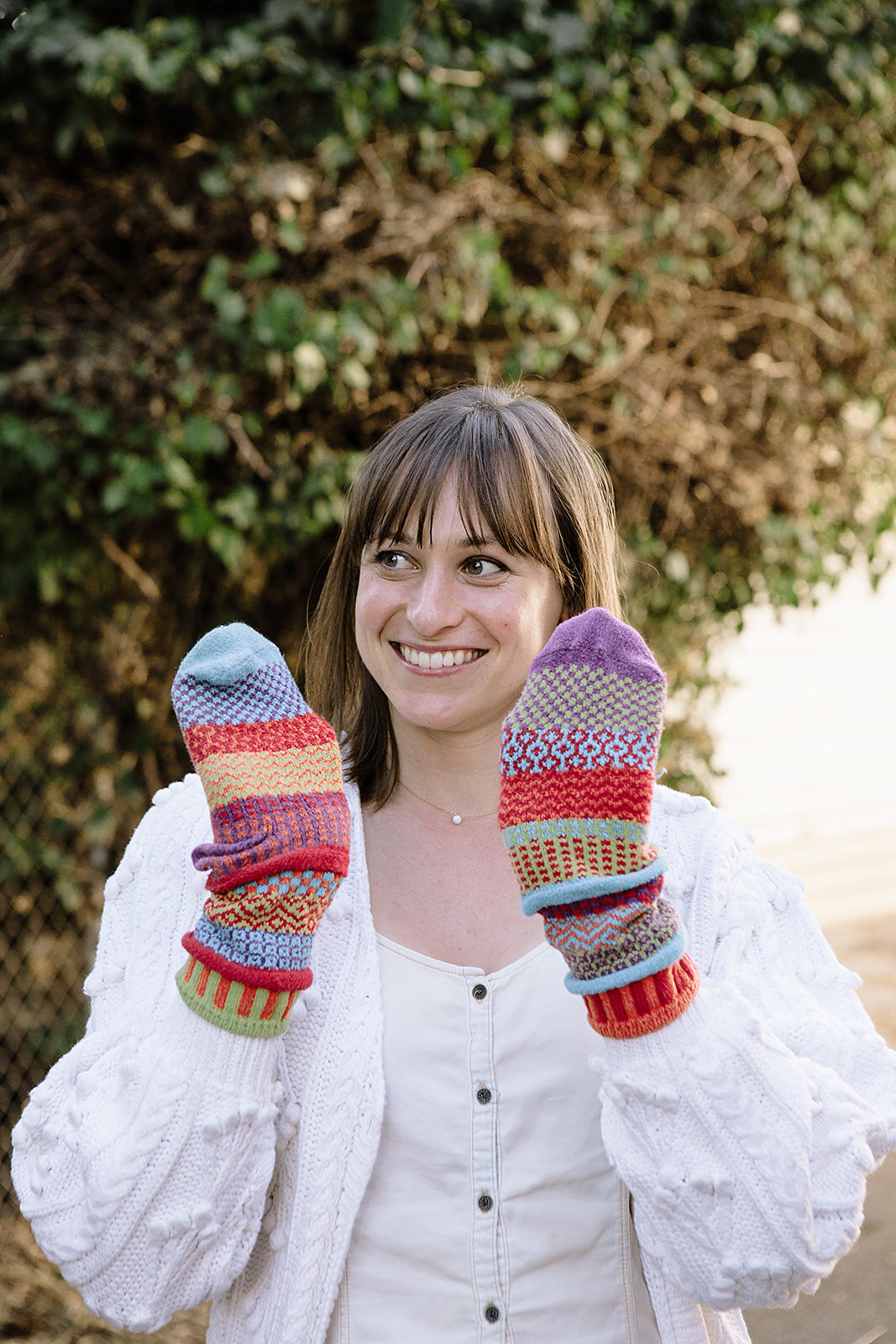For this month’s interview, we hear from Kayla Tsongas, MSW, as she shares with us about the necessity for rest in our lives as we care for ourselves.
You will find the transcript of the interview below.
Allie Ramsey: So hello Kayla!
Kayla Tsongas: Hi Allie, how are you?
AR: Good. So you are one of the more recent clinicians to join MHT, which is very exciting -- and also just a wonderful human. We are very happy that you're here. This is kind of a fun opportunity for us to get to hear a little bit more about what makes you tick, and some of your philosophy and perspective on life, which I think will be fun to get to hear about. So, tell me Kayla, what does humanness mean at you?
KT: What does humanness mean to me - as I was reading this question before this interview I found it was such a huge question, and how do you distill down “What is humanness?” So I am just going to choose a tiny piece of what humanness means to me today. What came to mind first was just the care that we have for others and how we show up in our relationships, and how we care for ourselves and what we do to nourish ourselves. And to be able to show up in our relationships as the best person that we can be.
And when we fall short, what do we do then? How do we repair that rupture and how do we sit and think about the ways that we want to care for people and the ways that we want to care for ourselves?
So really mostly what came to mind for me was the caring between people within our relationships. And also in particular the care that we have for ourselves and how we care for ourselves.
AR: Yeah, I like that. It makes me think of the art of caring and how we can learn to care in more complex ways, in different ways overtime. Can you talk a little bit about your thoughts on the human journey of learning to care?
KT: Yeah, absolutely. I think that is a lifelong journey that we are on and we're all going to walk that path through learning how to care for others and for ourselves. Learning new ways from having different experiences every day. And we compile what we have and we try and care in the best possible way that we can. And you know, throughout our life, I think that we have many different caring experiences with people who are very close to us, with our clients, with ourselves, with people that we just have a passing caring interaction with on the street. And what does it mean to you and what do you learn from each of those interactions? And how do you take that as you walk forward? That is really what I see as humanness; what do you do with what you've learned during those caring interactions, and how do you care the next time, and how is it different or how is it similar? And being able to have some capacity for self reflection on that; the ability to look inward about caring. And then after doing that, care for yourself.
AR: Yeah, that’s the other thing that stood out to me about what you said: the caring for ourselves as part of being humans. And it is pretty special about us humans that we can have a relationship with ourselves. Can you talk a little bit about your thoughts or musings on our relationship with ourselves?
KT: Yeah. Another big one. The relationship with ourselves. I also think that caring for ourselves is a lifelong journey and we need different things, in different ways, in different times of our lives -- and even in different days of the week and different minutes of our days. What do we need to do for ourselves? And becoming more in tune, how we learn to become more in tune with what we need, so that we can care for others. And kind of that understanding that we often don't care very well for ourselves, and that's OK. We try. We may try, but in caring for ourselves we may also fall short as we do in caring for others, and learning from that experience as well for the next time.
AR: Yeah. The way you're talking about it, Kayla, just makes me think about how worthy a pursuit it is to care for ourselves well and care well for others, and also how important it is to extend some graciousness to ourselves in that process, because we aren’t going to get it perfect.
KT: Absolutely.
AR: Well maybe that's connected in some ways, it makes me think of the word you chose from our series we’ve been studying as a group from David Whyte’s Consolations: Rest. Can you talk a little bit about what makes that word meaningful to you?
KT: Yeah, it's very much connected to the caring for others and caring for ourselves. I wanted to read my favorite sentence from that, because it's really stayed with me and made a large impression on me.
“Rested we are ready for the world but not held hostage by it. Rested we care again for the right things and the right people in the right way. In rest, we re-establish the goals that make us more generous, more courageous, more of an invitation, someone we want to remember. And someone others would want to remember too.”
So in that passage the being ready for the world but not held hostage by it, how can we focus on finding that space of rest? And maybe it’s that space of caring for ourselves, where we can walk through our day and especially in our profession being clinicians, how we walk through it and live it in the moment and not be held hostage by it. I know that has been, you know, a huge process for me and learning how to try to walk through the world without it taking a hold of me and [causing] stress and anxiety in those experiences.
“Rested we are ready for the world but not held hostage by it. Rested we care again for the right things and the right people in the right way. In rest, we re-establish the goals that make us more generous, more courageous, more of an invitation, someone we want to remember. And someone others would want to remember too”
What does it mean to be rested and to care enough for myself so that I am not held hostage by the world and all the worries that exist in it? So that is one of the reasons I chose the word rest because especially during this past year and a half during the pandemic I’ve really had to focus on finding new ways to feel rested and to not feel held hostage by the world.
And also walking through this experience with my clients has been such an incredible privilege because it's one of the only times where we're all going through the exact same thing. We may have different experiences within the larger experience, but we're all going through this pandemic together, and it can build a lot of community. It takes a large toll, and so how do we find the best possible way to get rested and to care for ourselves and take care of others during such a trying and scary time.
AR: I like hearing you talk about the journey you've been on learning to be rested yourself and then approach the world from that place [of rest]. I can just hear as you talk about it, how meaningful that is to you. And it sounds like there is something that has kind of like opened up for you. There's a way of experiencing life and relationships that has opened up for you as you have claimed more rest for yourself.
KT: Absolutely. I have felt in the last few years my capacity opening, my ability to care for others opening, through understanding what rest is, and what rest is for me, and what rest is for the people I love, and [what rest is] for my clients. And really sitting in it and feeling into it, it's been such an incredible learning and growing experience.
AR: It sounds like that may have something to do with how humanness shows up for you in your work as a clinician.
KT: Yeah, I absolutely think it is so connected. Particularly, caring for others means you have to care for yourself. And if you don't care for yourself then how can you show up for other people? How can you show up in your work as a clinician if you’re not taking the time to get rest and to care for yourself?
And then the privilege that it is to just sit with your clients and care for them and that exchange between the two of you. In opening up that compassion and being able to have a discussion about what caring for oneself looks like for each person. [Each individual’s] needs are so different. Exploring into that and exploring how a client cares for others and what they can learn about that and themselves. Creating that space of this almost circular caring, where we are caring for each other and it's creating a bigger and more connected community just by spending that time and space.
AR: Yeah, it’s kind of a positive feedback loop that can get going with that. Therapy to change the world, Kayla.
KT: (Laughing) That’s the idea.
“Caring for others means you have to care for yourself. And if you don’t care for yourself then how can you show up for other people?”
AR: I can see how much you love helping your clients learn what helps them rest or really become rested. It’s interesting to hear you talk about how unique a process that might be for each of us.
KT: Yeah, it’s so different for every person, and getting creative and playful and finding what rest means and supporting others finding with rest means for them is a true honor and privilege.
AR: Well, Kayla, thank you so much. It's been fun to hear some of your musings and thoughts about life and therapy. And we’re just glad you’re here, providing wonderful therapy in NELA.
KT: Thank you so much. It's such an incredible experience to be in this community.
Kayla Tsongas, MSW deeply believes in the fundamentality of imagination, creativity and play for the development of children and adults alike. She invites clients of all ages to be curious about their relationships, struggles, and dreams within a framework of creativity and emotional safety. She recognizes collaboration between client and therapist as a foundational ingredient to psychotherapy – a process that is marked by deep exploration, which can potentially foster change and build resilience.
Allie Ramsey, LMFT has worked with individuals and families on a broad range of issues, including trauma, relational challenges, adoption, anxiety, depression, faith integration, and aging. She has training and experience in a wide variety of treatment modalities, and works to tailor her therapeutic approach to the unique needs of each client.



















